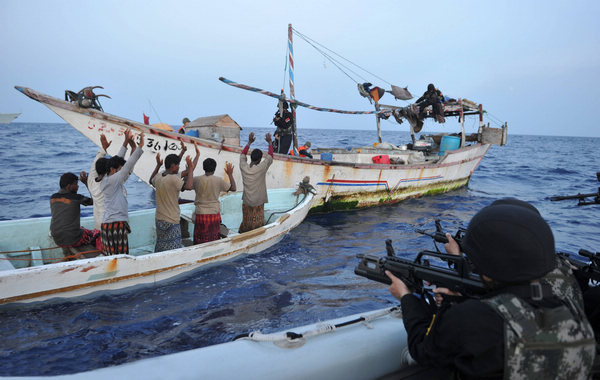Foreign and Military Affairs
China looks to bolster defenses against pirates
By Xin Dingding (China Daily)
Updated: 2011-05-09 07:29
 |
Large Medium Small |
 Soldiers with a Chinese navy flotilla, which carries out escort missions in the Gulf of Aden, inspect a questionable boat in this file photo. [Photo/Xinhua] |
BEIJING - China is mulling over new ways to protect ships and sailors from being hijacked by pirates in the Gulf of Aden and in waters off Somalia, according to the water transport authority.
To that end, it is also calling for international cooperation in the fight against piracy.
So far this year, pirates have attacked 118 vessels and hijacked 20 ships. In the past week, they assaulted two ships with Chinese sailors on board.
The Singapore-registered chemical tanker MT Gemini is believed to have been hijacked by Somali pirates on May 1. Five Chinese sailors were on board the captured ship.
And a Panama-flagged bulk carrier, Full City, with 24 Chinese sailors aboard, was attacked by pirates on May 5.
Xu said that ship was saved in the end thanks to international cooperation.
The vessel carrying 26,000 tons of chemical fertilizers from Jordan to India was attacked in the Arabian Sea, some 450 nautical miles (833 kilometers) off the coast of Mumbai in India, which is "a traditionally safe area", he said.
At the time, the Chinese navy's flotilla was on escort duty in the Gulf of Aden - 1,200 nautical miles away from the scene of the assault. It was thus the navies of other countries, Turkey's and India's among them, that helped to drive away the pirates and escorted the ship to safety, he said.
Also helping were self-defense measures taken aboard the ship.
The sailors entered a special cabin that was built to prevent pirates from entering and was stocked with necessities for those living inside. And an electrified wire mesh installed on the ship put up an obstacle to the pirates coming aboard, giving the sailors time to seek safety, he said.
The ministry is now trying to learn what other measures can be adopted to strengthen ships' defenses and is mulling over options like paying security-service companies to station guards on board, he said.
A security chief at a domestic shipping company, who spoke on the condition of being granted anonymity, told China Daily on Sunday, , that some countries have hired security companies to protect merchant ships.
One advantage to employing such companies is that their employees, under agreements with various countries, can be armed on certain shipping routes. Sailors on merchant ships, in contrast, are not allowed to carry weapons, he said.
Meanwhile, the vice-minister said sailors should watch out for their own best interests when they seek employment.
"Many Chinese sailors now work for foreign shipping companies, but some are small," he said. "Once hijacked, these small foreign shipping companies just disappear at times, abandoning the hijacked ship and leaving sailors on their own.
"Sailors should know more about a potential employer before signing a work contract. Government departments and non-governmental organizations, such as China Shipowners' Association, can provide information to sailors about foreign shipping companies."
Wang Junyao, secretary-general of Qingdao Shipowners' Association in the coastal city Qingdao of Shandong province, said the association has started to collect as much information about foreign shipping companies as is gatherable, trying to learn their places of registry, the number of ships they own and the routes they operate on.
"It is not just because of the pirate hijackings," he said. "Sailors' rights need to be better protected, too. We had none of these problems in the past, but with more people working for foreign companies, it has become an urgent task."
| 分享按鈕 |




